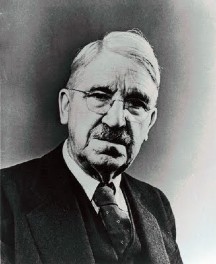John Dewey: Education Was Never About Learning
August 10, 2010

(left, John Dewey 1859-1952 institutionalized stupidity in our school system)
Illuminati Communism in Our Schools
by L.C. Vincent
for henrymakow.com
No one has had a more pernicious effect on American education, and by extension the corruption of American society today than John Dewey. Born in 1859, John Dewey turned historic American values and logic upside down.
In Dewey's view, the individual existed only to serve society. "Socialization" (i.e., the individual's conformity to a group) was seen as more important than factual learning. This twisted view of education infected all of his work, resulting in a century of ever diminishing American academic achievement, with the resultant corruption of American society.
TURNING EDUCATION UPSIDE DOWN
John Dewey received his doctorate from Johns Hopkins University about 1883, and joined the staff of the University of Chicago in 1894. In 1899 he was elected President of the American Psychological Association and from 1904 until his death in 1952, he was a professor of philosophy at Columbia University and Teacher's College in New York.
According to Dewey, learning was only
relevant in context of what Society, and by extension The State,
deemed necessary. The acquisition of knowledge for its own sake was
regarded as a selfish indulgence.
Feelings and emotions were far more valid a barometer of a student's "adjustment" towards society than information, or the use of logic and reason. It should come as no surprise, then, that throughout most of his professional life, Dewey proudly wore the label of a "Social Progressive."
Dewey was a great admirer of Edward Bellamy's book, "Looking Back" (1877) which described a Utopian society built upon the ashes of capitalism.
According to Dewey, Government comes first and its needs must therefore be paramount over the individual. Society (government) shapes individuals, not vice-versa, claimed Dewey.
If the Powers That Be ("society") decided literature, or geometry, or chemistry is no longer a valid pursuit, but multicultural studies, minority oppression, and remedial basket weaving are, then the individual should have no alternative to that course of education.
Every virtue, including curiosity, resourcefulness, competitiveness, ethical conduct, right reasoning, rhetorical skills, logic and inventiveness -- could be considered to be "vices" overnight if the Powers That Be ("Society") decided they were no longer desirable.
In Dewey's world, there was no absolute truth. Therefore everything was malleable and changeable. There was no bedrock, no anchor upon which mankind might attach and secure their intellect, their character, or their conduct. Everything was continually in a state of flux, with the only constant being one's "duty" to society, to serve it however society chose to dictate through its institutions.
An emphasis on group participation, group
learning, group problem solving and group activities hammered home
the one unbending principle that the individual's must always subservient to the "group."
Above all, Dewey wanted "top down" control of society. His philosophy was essentially the Rockefeller's, who sponsored the universities. Dewey wanted to create cogs for America commerce, just sufficiently intelligent to follow instructions. The goal of self-improvement were seen as a dangerous and detrimental deviation.
In our schools today, the current
constant whirlwind of parties, drugs, sports, movie stars, sexual
promiscuity, video games, violence, gangs, and celebrities -- the
real unwritten core curriculum of today's centers of higher
education -- are the "new normal."
Children who differ from this norm leave
themselves open to ridicule, hostility, sabotage and disparagement
for being "different" than their group-herd mentality peers.
Part Two -Later This Week
lcvincent88@bigstring.com







Ed said (August 11, 2010):
just looked at Pt. 1 of L. C. Vincent's piece on John Dewey, and found it to be true as far as it went, which isn't very far. I've read John Taylor Gatto's book /The Underground History of American Education/, in which Gatto traces the beginnings of the movement toward compulsory state-sponsored education back to the 18th century, when European aristocrats learned of the power that Chinese mandarins and Indian Brahmins held over their social inferiors, and became jealous, and desirous of bringing about a similar situation in the West. Gatto goes over the history of public education in the United States, and convincingly makes the case that the elite class worked for a very long time to bring it about, with the sole purpose of bringing the lower orders into line.
See: http://www.johntaylorgatto.com
Incidentally, everything that Gatto discusses can be found in the public record, even if much of it is rather obscure. This adds to the power of his work.